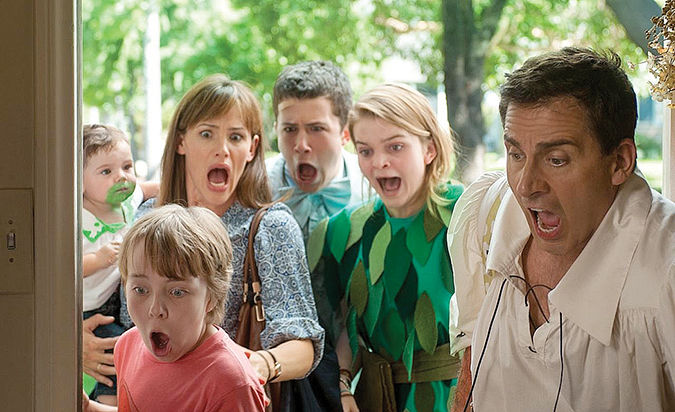Alexander and the Terrible, Horrible, No Good, Very Bad Day (Disney)
This manic comedy, based on the 1972 children's book by Judith Viorst, follows the exploits of the titular 12-year-old boy as he experiences the seemingly worst day of his life. But in a departure from the book, director Miguel Arteta and screenwriter Rob Lieber extend the mayhem to Alexander's family members so they, too, can feel what it's like for Alexander at the very bottom of the totem pole.
Alexander's downward spiral starts with gum stuck in his hair, a portent of the calamities to come. He's ridiculed by students at school, fails to impress the pretty girl in class, and nearly burns down the science lab.
Worst of all, Alexander gets no sympathy, or even much attention, at home. His mom is preoccupied with her job at a publishing company. His stay-at-home dad is busy with 1-year-old Trevor. The older siblings are equally self-absorbed.
So as his birthday dawns, Alexander makes a wish: that his family could know what it's like to have a really awful day. Needless to say, they all do.
If you can look beyond the relentless physical gags and bathroom humor, there's a small lesson here in how a family pulls together in the midst of adversity. In the words of Alexander, "You've gotta have a bad day so you can love the good days even more."
The film contains mild family discord, some bathroom humor and references to body parts. (A-II, PG)
The Judge (Warner Bros.)
In strictly cinematic terms, "The Judge" is an adequate but overextended drama in need of further editing. From a moral perspective, however, the inclusion of a seamy subplot, dealt with in an inappropriately offhand manner, mars director David Dobkin's otherwise mostly warmhearted film. Its presence also calls for mature discretion.
When his mother's death brings hotshot Chicago lawyer Hank Palmer (Robert Downey Jr.) back to his rural Indiana hometown, his plan is to attend her funeral then bolt back to the Windy City. Central to his desire to cut his visit short is his chilly relationship with his estranged father Joseph (Robert Duvall), the burgh's respected magistrate.
But when aging, forgetful Joseph is accused of causing a fatal hit-and-run accident and turns to semi-amateur local attorney C.P. Kennedy to helm his defense, Hank not only sticks around, he becomes increasingly exasperated by C.P.'s timidity. All the more so, since a hard-hitting special prosecutor (Billy Bob Thornton) proves zealous in his efforts to obtain a conviction.
As Hank and Joseph butt heads on how to handle the case, soon-to-be-divorced Hank rekindles his romance with his high-school sweetheart and revives his relationship with his two brothers.
Earlier, Hank has shown that Samantha isn't the only girl in town for whom he has eyes, and it's through his seemingly meaningless encounter with a stranger that the movie's most troubling element eventually comes to the fore. The heinous upshot is treated so nonchalantly that ethically acute moviegoers are likely to shake their heads even as they squirm.
The film contains nongraphic casual sexual activity involving unintentional incest, some scatological humor and images, about a dozen uses of profanity and considerable rough and crude language. (L, R)
Left Behind (Freestyle)
Catholic viewers will likely feel left out by this film. In part, that's a good thing since, in bringing the first in a series of novels by Tim LaHaye and Jerry B. Jenkins to the big screen, director Vic Armstrong has steered clear of the anti-Catholicism that characterized the overall saga's print version.
What remains, however, is a low-rent drama based on an interpretation of the Apocalypse at odds with church teaching on the subject. That, by itself, makes this inappropriate fare for youngsters — or poorly catechized adults for that matter.
Like a previous set of films based on LaHaye and Jenkins' works, this reboot rests on (and exists to promote) rapture theology. As portrayed here, that's the notion that there will be stages to the Second Coming of Christ, the first of which will be the sudden gathering up to heaven of all true believers.
Those unfortunate enough to find themselves in the situation of the title will then face a period of tribulation characterized by the famines and earthquakes Jesus prophesied in Chapter 24 of St. Matthew's Gospel. In the end, "Left Behind" amounts to little more than a 1970s-style disaster movie with a tedious overlay of misguided messaging.
The film contains themes requiring a solid grounding in faith, pervasive mayhem with brief gore, drug use and a single crude term. (A-III, PG-13)
—CNS/USCCB
CNS classifications: A-I — general patronage. A-II — adults and adolescents. A-III — adults. A-IV — adults, with reservations. L — limited adult audiences, films whose problematic content many adults would find troubling. O — morally offensive.

